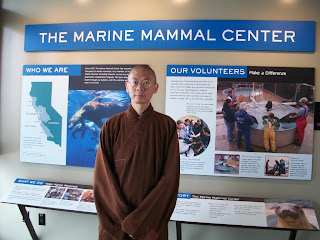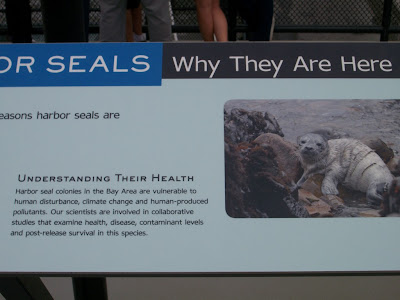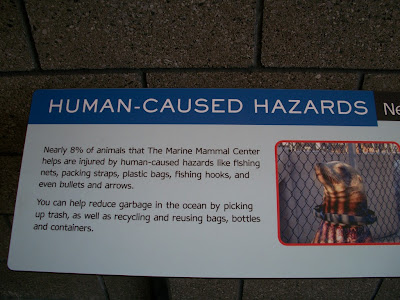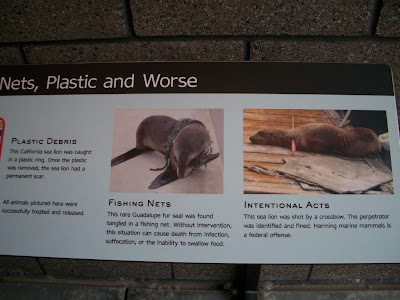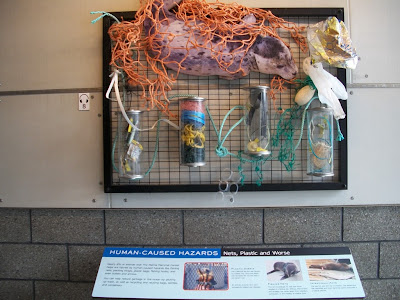 Marine Mammals teach us about how our choices here at home affect the health of the oceans and all the living beings within them. Master Jian Hu urges CTZen Center members to learn about The Marine Mammal Center--its mission and the education it provides about the impact of our human choices on the coast.
Marine Mammals teach us about how our choices here at home affect the health of the oceans and all the living beings within them. Master Jian Hu urges CTZen Center members to learn about The Marine Mammal Center--its mission and the education it provides about the impact of our human choices on the coast.Our planet is almost 80% oceans. With about 6 billion human beings now living on the planet, the impact of our presence on the land impacts the ocean environment tremendously. In recent years, the oceans and all of the living beings within them, not to mention the living beings who depend upon the coast lines, are now facing increasing perils. Much of those dangers are because of mindless human impact upon the planet. Education about the ocean environment and our interdependence with ocean creatures is needed now more than ever.
Increasingly, fish supplies are being depleted by over-fishing, global warming and oil spills, which produce micro-organisms that consume oxygen in the water available for fish to breathe. New increases in contaminants in ocean waters are causing mysterious rises in toxic algae blooms, producing seizures and brain damage in sea lions, for example. Sea lions are an "indicator species," revealing trends in the health of the entire ocean environment. Whales have been beaching more commonly, and upon examination after death, reveal that they swallow large amounts of netting and plastics that have been dumped into the waters. Sea turtles are found dead too often, having eaten plastic bags, which resemble jelly fish, their natural food, and then starve. Rates of cancer have been rising in seals and sea lions, which correspond to human cancer. If allowed to continue unchecked, the food web itself in the oceans will begin to collapse as a result of human consumption and pollution. Fortunately, some people are working hard to intervene and to educate others.
One place that leads world marine science in understanding the impact of human choices on the oceans is The Marine Mammal Center (TMMC), the largest marine mammal hospital, research and education center in the world. Tucked away in the Marin Headlands, near Sausalito, north of the Golden Gate bridge, TMMC runs a year-round operation rescuing, rehabilitating and releasing marine animals, such as California Sea Lions, Stellar Sea Lions, Elephant Seals, Harbor Seals, Northern Fur Seals, dolphins, migrating whales and sea otters. It rescues orphaned, injured, sick and stranded animals from 600 miles of California coastline by deploying a fleet of rescue trucks and volunteers out of several "stranding outposts," stretching from San Luis Obisbo to Mendocino County. The main hospital is in Sausalito, and last year, when the facility opened, it received much public acclaim and won a Bay Area Green Architecture Award for its green building/engineering design.
We, the Zen Center group, was led on a tour by the center's Executive Director, Dr. Jeff Boehm. They learned about the centers' history as a converted missile base to a marine mammal hospital on public lands overlooking and protecting the coast at Rodeo Beach. They learned about marine mammals, animal medicine, volunteer programs, leadership development and education at the center. Charlotte Bear is a volunteer at the center in animal care, education and the Speakers' Bureau. Oliva and Judy wanted to become members on the spot, and they took home information for their family members and the CTZen Center about volunteering and donating. Master Jian Hu talked about the center in the Level I Buddhism class that evening, and he encouraged disciples to get to know the story of the center. This article is intended to provide information that assists Master Jian Hu's request.

Almost 1,000 volunteers keep the center running, working in animal care, education, outreach, development, communications, youth program and special events. In 2009, the center treated 1,700 patients. About 50% of these endangered species survived the trauma they had suffered and were released. That's 50% more than would have survived otherwise. The center is open everyday to the public for free, with low-cost tours available. For more information about The Marine Mammal Center, visit www.marinemammalcenter.org.
